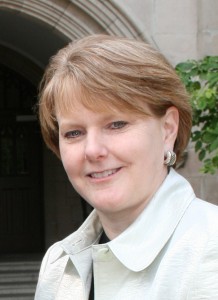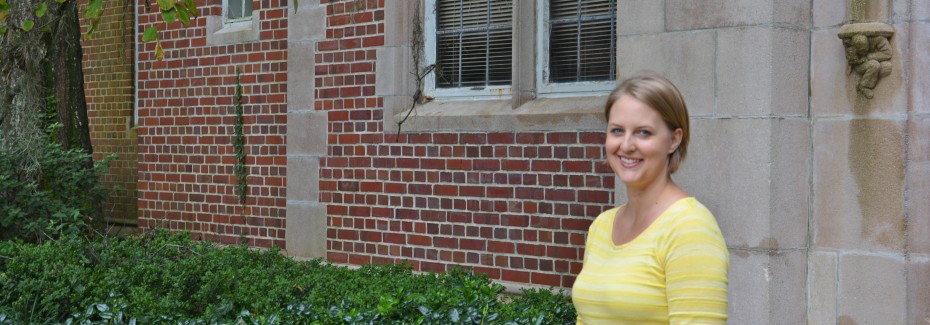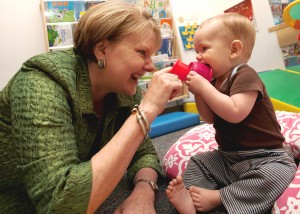Study promotes early learning in everyday activities for infants, toddlers with disabilities
GAINESVILLE, Fla. — In a multi-center study, Florida and Illinois researchers are testing a promising approach to help parents and caregivers of infants and toddlers with disabilities advance their child’s learning through everyday activities and routines.
The researchers, from Florida State University, the University of Florida College of Education and the University of Illinois at Chicago, have received a highly competitive grant worth $1.5 million from the federal Institute of Education Sciences to develop and test an early intervention strategy for the people most important in these young children’s lives—the parents, grandparents or others entrusted with their daily care and well-being.
The project’s co-principal investigators are Patricia Snyder, professor and holder of the David J. Lawrence Jr. endowed chair in early childhood studies at UF; Juliann Woods, a professor of communication sciences and disorders at FSU; and Christine Salisbury, a special education professor at UIC.
“Learning begins at birth,” Snyder said. “Infants and toddlers—especially those with disabilities—benefit from responsive interactions and early-learning experiences in everyday activities.”
The new approach, known as EPIC (short for embedded practices and intervention with caregivers), teaches therapists, teachers and other early-learning practitioners how to help parents and caregivers recognize and capitalize on the countless learning opportunities that occur in a child’s daily routine—in common activities like playing peek-a-boo, drinking from a cup, rolling a ball or getting into a car seat.
“Early intervention for young children with disabilities traditionally has involved practitioners working directly with the child. Very little time is spent supporting regular interactions and learning opportunities between the parents and child,” said Woods of FSU.
The EPIC team is developing a “curriculum” for early-intervention providers with guidelines for coaching parents to incorporate responsive learning experiences into their children’s everyday activities. Feedback from the practitioners will aid the researchers in field-testing and finalizing the coaching and intervention processes.
“With this intervention approach, caregivers of young children with significant disabilities will learn how to enhance their interactions in meaningful and useful activities to support learning,” said Salisbury of UIC.
The two-state EPIC project is one of only 13 projects funded this year by the Institute of Education Sciences out of more than 900 applications, due to federal budget cuts.
Researchers say the new approach could benefit tens of thousands of America’s youngest children. According to U.S. Department of Education figures, nearly 350,000 infants and toddlers under age 3 who have disabilities are enrolled annually in federal programs providing early intervention services. About one in every five, or 70,000 children, has a diagnosed physical or mental condition likely to impede normal development. Among the conditions are Down’s syndrome, impaired vision or hearing, neurological impairments, social and emotional delays, and other genetic conditions.
Recent studies identify the use of “embedded instruction” in everyday activities as a recommended practice for young preschoolers with disabilities, but researchers say additional studies are needed to identify the best methods for showing parents how to engage their children in these natural learning opportunities.
A core element of the EPIC intervention is a set of five questions—the “5Q process”—with accompanying visual cues that help parents recognize an opportune time, place, or activity to teach their child, how and what to teach, what their goals and expectations are, and how to know if it’s working.
“Visual cues might be a video clip or a cell phone app, or simply an eraser board message on the refrigerator reminding parents about mealtime teaching opportunities,” Snyder said. “The five questions quickly become second nature in daily interactions with their child.”
The three-year study started in June at each university site in Florida and Chicago with focus groups and a review panel of practitioners and parents evaluating the EPIC intervention and resource materials. A small tryout trial involving eight children and their families, and their intervention providers, will follow to confirm the method’s feasibility and acceptance by participating providers and families and to adjust the intervention as needed.
In the second year, researchers will further test the intervention with three individual children with disabilities and their families; the final phase in Year 3 culminates with a pilot comparative study of two groups—an EPIC test group and another receiving traditional intervention—involving 20 families in Florida and 20 in Illinois.
“We anticipate our study results will support the need for larger-scale studies to demonstrate that EPIC is an effective, recommended approach in early intervention,” Snyder said.
CONTACTS
SOURCE: Patricia Snyder, the Lawrence Endowed Professor in Early Childhood Studies, UF College of Education, 352-273-4291; patriciasnyder@coe.ufl.edu
WRITER/NEWS DESK: Larry Lansford, director, news & communications, UF College of Education, 352-273-4137;llansford@coe.ufl.edu







